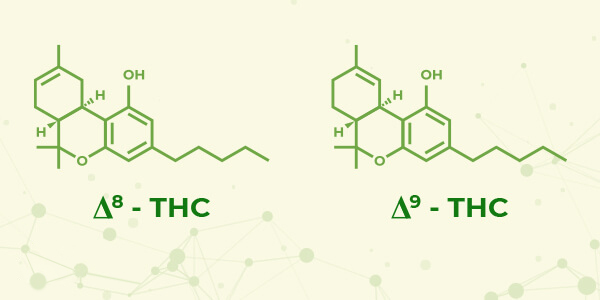What’s the Difference Between Delta 8 vs. Delta 9 THC?
Posted by DaySavers Team on Apr 20th 2024
First Published: May 5th 2022
Updated: April 20, 2024
Looking at a delta-8-tetrahydrocannabinol (delta-8-THC) molecule next to a delta-9-THC molecule, the only difference you’ll see is the location of a double bond between two carbons.
But that tiny double bond carries huge implications when it comes to federal legality, thanks to the Agricultural Improvement Act of 2018 (The Farm Bill) because of the difference in where those two molecules come from.
We’re all familiar with delta-9 THC, for example. It’s the chemical in the Cannabis sativa plant that creates the “high.” It is also the amount of that chemical that now officially defines the difference between "cannabis" and "hemp", thanks to the law mentioned above.

According to the Farm Bill, a Cannabis sativa plant with more than 0.3% delta-9-THC qualifies as cannabis and is federally illegal. However, a Cannabis sativa plant with less than 0.3% delta-9-THC qualifies as hemp and is federally legal.
Delta-8 THC, unlike delta-9, is found in very small amounts in the plant, but generally created in laboratories using federally legal hemp plants and a chemical catalyst. So despite its potential to impart a high, it is considered a legal substance because it comes from plants legally considered hemp, not cannabis.
Even the courts have upheld the legality of hemp-derived delta-8, with the Ninth Circuit Court of Appeals in 2002 concluded that delta-8 products "are lawful under the plain text of the Farm Act."
But that legality doesn’t mean it’s not without confusion and controversy, particularly in the wake of a March 2024 study from the National Institute of Health that found that 11% of high school seniors had used delta-8 products. Not coincidentally, the study also found delta-8 use was more common in the South and Midwest regions and in states without cannabis legalization or delta-8 regulations.
But what exactly is delta-8 THC? How is it made? What does it do? And where is it legal?
Read on to explore those issues, find out what might actually be in your delta-8-THC products, and see how delta-8 vs. delta-9-THC compare overall.
What is delta-8 THC?
Delta-8 THC is what is known in chemistry as an “isomer” of the more well-known delta-9 THC. Chemically speaking, an isomer is a molecule made up of the same number of atoms, but arranged in a different order. In this case, it’s the location of that one double bond between two carbon atoms.
And like its more commonly known cousin, delta-8 THC binds to cannabinoid receptors in the brain, creating a psychoactive effects that are familiar to cannabis users. However, unlike delta-9 THC, it is not found in abundance in the plant and is usually created in laboratories.
How is delta-8 THC made or extracted compared to delta-9?

While delta-9-THC can exist in abundance in cannabis (modern cultivators achieve over 30% dry-weight content), delta-8-THC exists in trace amounts in the hemp plant. In fact, for most hemp farmers and delta-8-THC manufacturers, it’s not physically possible or fiscally responsible to naturally extract delta-8 because it occurs in such minimal amounts.
So, instead of extracting delta-8-THC from a plant like manufacturers do for delta-9-THC, many delta-8 product manufacturers synthesize their delta-8 in a lab. They do so by using a catalyst, like the solvents toluene or heptane, to convert cannabidiol (CBD), which is found in hemp in larger amounts, into delta-8-THC. And since hemp-derived products are not yet regulated, consumers aren’t guaranteed that those solvents and acids are removed before the delta-8 product is put up for sale.
To put that into perspective, ProVerde Laboratories, a cannabis and hemp testing firm, has tested thousands of delta-8-THC-labeled products, and their Chief Scientific Officer says he’s yet to find one he’d consider "a legitimate delta-8-THC product".
Ways To Consume the Different THCs
Both delta-8 and delta-9 THC are available in the typical cannabis and hemp consumption methods: flower, pre-rolls, vapes, concentrates, edibles, etc. However, because the extraction process—or synthesizing process for delta-8—varies so substantially, there are key differences between the two types of products.
Let’s consider flower, for instance. When you buy cannabis flower, or delta-9-THC flower, you’re purchasing a physical part of the plant. You’re taking home flower, or bud, or a nug, or whatever you want to call it, that was literally picked off a plant, and you’re smoking the delta-9-THC the plant itself created.
On the flip side, when you purchase delta-8-THC hemp flower, you’re getting something quite different. Because delta-8-THC naturally occurs in such tiny amounts, you can’t actually buy delta-8-THC flower like you can delta-9. Instead, what’s available is hemp flower that’s been sprayed with a synthesized delta-8-THC chemical.
The same is true for all other methods of consumption. Delta-9 edibles, concentrates, vapes, etc. usually contain naturally derived delta-9 because delta-9 exists in large enough quantities in the cannabis plant for it to be extracted and infused into other products. Most delta-8 edibles, concentrates, vapes, etc. are going to contain the lab-made chemical because delta-8 doesn’t naturally exist in large enough quantities for it to be extracted.
Potency of Delta-8 vs. Delta-9-THC
The biggest draw to delta-8-THC products is that they impart a high similar to delta-9, but are federally legal. Most delta-8 consumers that have also tried delta-9-THC report experiencing a milder high with fewer negative side effects, leading to delta-8 products being described as “THC Light” or “diet weed.”
At this point, there’s not a lot of clinical research available for delta-9-THC and even less for delta-8-THC. However, there is plenty of anecdotal evidence regarding the potency and effects of delta-8’s high as it compares to the high of delta-9-THC.
A 2022 survey submitted to the Journal of Cannabis Research questioned 521 self-reported delta-8 users to gauge their experience with delta-8 THC. Here’s what they found:
- On average, respondents reported experiencing paranoia and anxiety somewhere between “not at all” and “a little” while using delta-8-THC.
- Most participants reported experiencing relaxation, pain relief, and euphoria (AKA a high) while still being able to perform their normal daily activities.
- Nearly two-thirds reported consuming delta-8-THC with edibles.
- This is important to note because edibles are processed in your liver before they hit your bloodstream. For delta-9-THC edibles, this process results in a more potent chemical called 11-hydroxy-THC, which is why delta-9 edibles have the reputation for hitting harder than other consumption methods. In rodent studies, it's been found that ingesting delta-8 has a similar effect, becoming 11-hydroxy-delta-8-THC when metabolized in the liver. While not yet proven in humans, this could mean you may feel stronger effects from a delta-8 gummy versus flower or concentrates, like you would with delta-9 edibles.
Where To Buy Delta-8 and Delta-9-THC

Although delta-9-THC is federally illegal, it’s now legal in 24 states and the District of Columbia for adult use and 38 states (plus DC) for medical use. That means that, state-by-state, delta-9 products purchased from state-registered dispensaries are extremely regulated and therefore deemed safe for human consumption.
Delta-8-THC is the opposite. Because it’s derived from hemp, it’s federally legal, but it’s not regulated at all. That means in states where it is unregulated, you can find it anywhere from gas stations to grocery stores to online shops.
However, several states have taken steps to regulate the substance and products made from it, so it is not legal everywhere, despite being federally legal, creating a state-to-state patchwork of regulations that can be befuddling to consumers.
For example, several states have an outright ban on the products. Others, like Washington and Michigan, regulate its sale through their legal cannabis programs. Then there are states where it is completely unregulated, like Oklahoma (though the legislature is debating a bill to bring it under the authority of the state’s medical program).
But, again, in places where they are legal, delta-8 products are federally unregulated. Even the FDA has weighed in to warn consumers about the products and the potential dangers lurking within. In fact, the FDA received 104 reports of adverse events in people who consumed delta-8 THC products between December 1, 2020, and February 28, 2022.
So before you make a delta-8 purchase, we highly recommend seeking out brands that provide third-party lab results for their products. A third-party lab test will show you what other chemicals are present in your product as well as how much delta-8 THC is actually present.
Additionally, the laws regarding delta-8 THC vary greatly from state to state with some regulating as part of their highly restrictive legal cannabis programs and others not regulating it at all.
Key Takeaways
Comparing delta-8 vs. delta-9-THC gets a little complicated when you consider how much delta-9 a cannabis plant naturally produces and how little delta-8 a hemp plant naturally produces. At the end of the day, what you’re really looking at is a lab-made cannabinoid vs. a naturally-occurring cannabinoid.
Both offer the benefits of relaxation and euphoria, but both are not created equal. When determining which is best for you, keep in mind legality in your state for each, your preferred consumption method, what your end goal with the product is and what the third-party lab results connected to your product say.
If you have questions about the other chemical compounds found within the Cannabis sativa plant and what their effects may be, take a look at our Glossary of Cannabis Terms.
Take it from us, THC isn’t the only compound worth exploring!
Looking at a delta-8-tetrahydrocannabinol (delta-8-THC) molecule next to a delta-9-THC molecule, the only difference you’ll see is the location of a double bond between two carbons.



